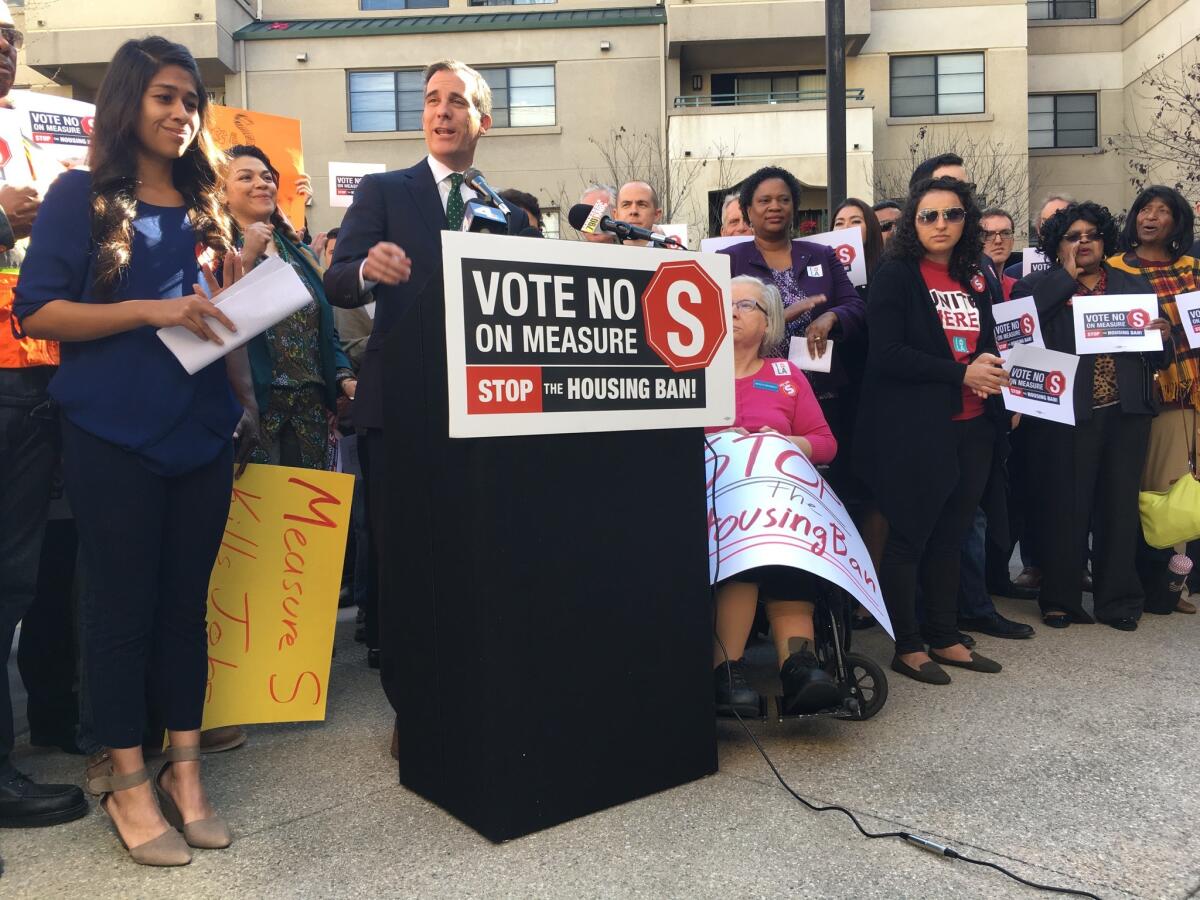L.A. elected officials make new push against Measure S

- Share via
With the city election five weeks away, Los Angeles’ elected officials launched a series of offensives Tuesday against Measure S, the ballot proposal that would impose new restrictions on many large-scale real estate developments.
Mayor Eric Garcetti, appearing with the opposition campaign in Little Tokyo, warned that passage of Measure S would undermine efforts to house the homeless using funds from Measure HHH, a $1.2-billion bond measure approved by 77% of voters in November.
Garcetti said affordable housing developers, looking to cut costs, frequently seek to build on land that is not zoned for homes. Those projects require a type of planning approval that would be barred under Measure S for at least two years and possibly up to a decade, he said.
“We won’t be able to spend the money that voters authorized” for homeless housing, Garcetti said. “We won’t be able to find the sites.”
In another part of downtown, the Los Angeles County Board of Supervisors voted to oppose Measure S. And at City Hall, Councilman Jose Huizar released a plan for updating the city’s 35 neighborhood planning documents — an issue that has been central in the Measure S debate.
The city’s community plans spell out what can be built in L.A. on a block-by-block basis. But the vast majority of them are more than 15 years old and, in the eyes of housing advocates, woefully behind changing real estate patterns and transportation initiatives.
Measure S, which is on the March 7 municipal ballot, would impose a two-year ban on real estate projects that require special planning approvals, such as increases in height or density. The moratorium would end sooner, however, if the city shows it has updated all of its community plans — a goal city officials say is impossible.
Jill Stewart, campaign manager for Yes on S, praised Huizar for “waking up to pressure from citizens” seeking more rapid approval of community plans. But she said such efforts should not dissuade voters from backing Measure S.
“The city, unfortunately, has a track record of saying they’re going to fix something, having a hearing, backing the reform and then it doesn’t happen,” she said. “Because of their disastrous track record, there’s a lack of trust that any of this is going to happen.”
Stewart also disputed the assertions by Garcetti and others that homeless housing projects are threatened by Measure S. Officials could move quickly to house homeless residents, she said, if they focus on developing projects on city-owned sites where homes are already permitted.
The Yes on S campaign, a group heavily backed by the Hollywood-based AIDS Healthcare Foundation, has spent more than a year highlighting the city’s frequent practice of changing planning rules for individual development projects. Those decisions, say Measure S supporters, are heavily influenced by campaign contributors — and have helped to make neighborhoods unaffordable.
Business leaders, labor unions and the city’s affordable housing groups say Measure S would trigger a dramatic slowdown in housing production, pushing already high rents even higher. They argue that the homelessness crisis would grow worse, with nonprofit developers unable to use long-established planning tools to win approval for their projects.
Because community plans are so out of date, development projects regularly need zoning changes, height increases and other changes in planning rules, foes of Measures S say.
Gary Toebben, president and chief executive of the Los Angeles Area Chamber of Commerce, said he fears Measure S would push thousands of construction workers into unemployment. Appearing with Garcetti, he called on city leaders to acknowledge that the lack of up-to-date community plans is a city “emergency.”
Huizar called for each of those plans to be updated every six years, making each document current by 2024. The council’s Planning and Land Use Management Committee endorsed that strategy, which is expected to cost $10 million annually, sending the idea to the full council for consideration.
Huizar praised Measure S supporters for raising the need for updated community plans. But he thinks even a two-year moratorium would put a stop to much of the city’s construction activity. “That will bring the city of L.A.’s economy to a halt,” Huizar said.
Stewart sharply disagreed, saying plenty of construction work will be provided by Measure HHH and Measure M, a half-cent transportation tax approved two months ago for rail and other transportation projects.
Opponents of Measure S, she said, “have to say something to stop the fact that we’re ahead and they’re in trouble.”
Twitter: @DavidZahniser
More to Read
Sign up for Essential California
The most important California stories and recommendations in your inbox every morning.
You may occasionally receive promotional content from the Los Angeles Times.













